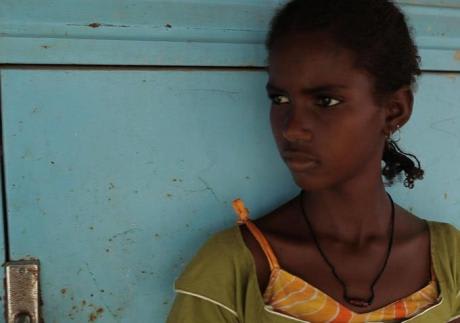The topic – a Senegalese teenager attempting to stop her younger sister's forced marriage – and themes – the conflict between modern education and tribal traditions – of Jeremy Teicher's Tall as the Baobab Tree are potent but drained of impact by his meandering direction and a script riddled with clumsy dialogue. His hope-filled chastisement of a practice that strips young girls of their rights in the name of custom and family obligation is "based on true stories", and it plays like a dramatized after-school special.
Before the plot is revealed, we meet Coumba (Dior Ka) and her little sister Debo (Oumul Ka) while the elder sibling is nervously preparing to hear the results of her exams, being one of the first of her village to attend school in the city. The scene then cuts to a young man trimming a tree surrounded by cattle.
Initially, this seems to be a clear juxtaposition meant as a metaphor for the students about to be pruned from the pack and returned to a life of field labour but judging by the lack of subsequent visual symbolism, it seems more likely that it's just the plot point it also serves as.
The man is Coumba and Debo's older brother, Sileye, who falls from the tree, injuring his leg. As a result, he's unable to tend the family's cattle and his father is stuck with a large hospital bill.
Hiding behind "God's will", the patriarch of the humble family decides that the only course of action is for Coumba to tend the cattle in Sileye's stead and for Debo to be sold into marriage to pay for her brother's treatment. Being the only educated voice among them, Coumba vehemently opposes her father's plan and cooks up a scheme of her own to acquire the money, enlisting the aid of a local boy who has a crush on her to watch the cows while she goes to the city to find work.
There isn't much thematic cohesion in the way Teicher films the picture but amid the arbitrary cinematography choices are some beautiful shots of the African landscape and its inhabitants.
Teicher's construction of the plot, with scripting aid from fellow amateur, Alexi Pappas, is more than a little clunky too, making it difficult to take this heavy topic seriously. At no point does the story touch on the affects of French colonization on tribal culture other than in the rampant "God" talk that infiltrates nearly every other stilted sentence spoken, laying the blame (or praise, depending on who's talking) for how the customs of these people have been shaped by outside influence on education alone.
Elevating the lethargic performances and unfocused filmmaking is a wonderful soundtrack of rich, complex kalimba-intensive regional music, which adds to the feeling of an environment with many important stories to share, but requiring more skilled hands to do so effectively.
(Visit Films)Before the plot is revealed, we meet Coumba (Dior Ka) and her little sister Debo (Oumul Ka) while the elder sibling is nervously preparing to hear the results of her exams, being one of the first of her village to attend school in the city. The scene then cuts to a young man trimming a tree surrounded by cattle.
Initially, this seems to be a clear juxtaposition meant as a metaphor for the students about to be pruned from the pack and returned to a life of field labour but judging by the lack of subsequent visual symbolism, it seems more likely that it's just the plot point it also serves as.
The man is Coumba and Debo's older brother, Sileye, who falls from the tree, injuring his leg. As a result, he's unable to tend the family's cattle and his father is stuck with a large hospital bill.
Hiding behind "God's will", the patriarch of the humble family decides that the only course of action is for Coumba to tend the cattle in Sileye's stead and for Debo to be sold into marriage to pay for her brother's treatment. Being the only educated voice among them, Coumba vehemently opposes her father's plan and cooks up a scheme of her own to acquire the money, enlisting the aid of a local boy who has a crush on her to watch the cows while she goes to the city to find work.
There isn't much thematic cohesion in the way Teicher films the picture but amid the arbitrary cinematography choices are some beautiful shots of the African landscape and its inhabitants.
Teicher's construction of the plot, with scripting aid from fellow amateur, Alexi Pappas, is more than a little clunky too, making it difficult to take this heavy topic seriously. At no point does the story touch on the affects of French colonization on tribal culture other than in the rampant "God" talk that infiltrates nearly every other stilted sentence spoken, laying the blame (or praise, depending on who's talking) for how the customs of these people have been shaped by outside influence on education alone.
Elevating the lethargic performances and unfocused filmmaking is a wonderful soundtrack of rich, complex kalimba-intensive regional music, which adds to the feeling of an environment with many important stories to share, but requiring more skilled hands to do so effectively.
